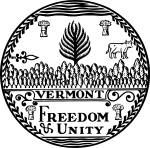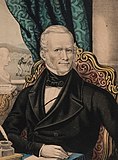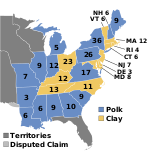1844 United States presidential election in Vermont
Appearance
| |||||||||||||||||||||||||||||||||
| |||||||||||||||||||||||||||||||||
 County Results
| |||||||||||||||||||||||||||||||||
| |||||||||||||||||||||||||||||||||
| Elections in Vermont |
|---|
 |
The 1844 United States presidential election in Vermont took place between November 1 and December 4, 1844, as part of the 1844 United States presidential election. Voters chose six representatives, or electors to the Electoral College, who voted for President and Vice President.
Vermont voted for the Whig candidate, Henry Clay, over Democratic candidate James K. Polk and Liberty candidate James G. Birney. Clay won Vermont by a margin of 17.88%.
With 54.84% of the popular vote, Vermont would prove to be Henry Clay's second strongest state after Rhode Island. Vermont would also prove to be James G. Birney's third strongest state after New Hampshire and Massachusetts.[1]
Results
[edit]| 1844 United States presidential election in Vermont[2] | ||||||||
|---|---|---|---|---|---|---|---|---|
| Party | Candidate | Running mate | Popular vote | Electoral vote | ||||
| Count | % | Count | % | |||||
| Whig | Henry Clay of Kentucky | Theodore Frelinghuysen of New York | 26,780 | 54.84% | 6 | 100.00% | ||
| Democratic | James K. Polk of Tennessee | George M. Dallas of Pennsylvania | 18,049 | 36.96% | 0 | 0.00% | ||
| Liberty | James G. Birney of Michigan | Thomas Morris of Ohio | 3,970 | 8.13% | 0 | 0.00% | ||
| N/A | Others | Others | 30 | 0.06% | 0 | 0.00% | ||
| Total | 48,829 | 100.00% | 6 | 100.00% | ||||
See also
[edit]References
[edit]- ^ "1844 Presidential Election Statistics". Dave Leip’s Atlas of U.S. Presidential Elections. Retrieved March 5, 2018.
- ^ "1844 Presidential General Election Results - Vermont". U.S. Election Atlas. Retrieved December 23, 2013.




